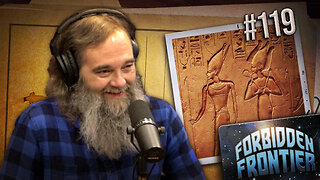Premium Only Content

Episode 3236: The Futility of Anxiety
www.catholic-reboot.com
Nightly Zoom Coordinates for Rosary:
Meeting ID: 865 8978 0399
Passcode: Wjjv4960!
Speak Lord for your Servant is Listening
Book Recommendation of the Day
St. John Chrysostom – Homilies on Matthew (Homily 22.1–2)
“For this cause, He [Christ] added, ‘Which of you by taking thought can add one cubit unto his stature?’ Because nothing is more fruitless than anxiety. For though you shouldst sit ten thousand years anxious, you wilt not add one cubit; but if God will, it comes to pass. Do you see how by degrees He shows the folly of the mind of them that are anxious? For first He points out that they concern themselves about things beyond their control, then that they are unworthy of such care, and lastly that they are unprofitable. For all this is quite as if one should say, Why do you trouble yourself? You can not lengthen your life by anxiety; on the contrary, you diminish it. Why then be anxious in vain?
The Futility of Anxiety
St. Padre Pio once said:
“Don’t worry. Worry is useless. God is merciful and will hear your prayer.”
These words strike us as both comforting and challenging. Comforting, because they remind us that we are not abandoned. Challenging, because they call us to renounce one of our most deeply ingrained habits: worry.
But this wisdom is not unique to Padre Pio. It flows from Christ Himself and has been echoed by the Fathers of the Church for centuries. Today we will explore the futility of anxiety in five parts:
1. The Scriptural foundation of Christ’s command not to worry
2. Padre Pio’s clarity and spiritual wisdom
3. The patristic insight: the Fathers of the Church on anxiety and trust
4. Modern application in an anxious age
5. The personal challenge for every soul
Archbishop Fulton J. Sheen often spoke about the uselessness of worry and anxiety, very much in harmony with Our Lord, the Fathers, and Padre Pio. One of his clearest lines on this is:
“Worry is a form of atheism, for it betrays a lack of faith and trust in God.”
Sheen explained that anxiety springs from trying to control what belongs to God, and that it ultimately reveals a failure to believe in His providence. He would sometimes add that worry is “wasted energy,” because it cannot change the outcome of events it only robs us of peace and weakens our trust.
Another line from Sheen on this theme is:
“All worry is atheism, because it is a want of trust in God.”
He also went into much greater detail:
“Since the basic cause of man’s anxiety is the possibility of being either a saint or a sinner, it follows that there are only two alternatives for him. Man can either mount upward to the peak of eternity or else slip backwards to the chasms of despair and frustration. Yet there are many who think there is yet another alternative, namely, that of indifference. They think that, just as bears hibernate for a season in a state of suspended animation, so they, too, can sleep through life without choosing to live for God or against Him. But hibernation is no escape; winter ends, and one is then forced to make a decision—indeed, the very choice of indifference is itself a decision. White fences do not remain white fences by having nothing done to them; they soon become black fences. Since there is a tendency in us that pulls us back to the animal, the mere fact that we do not resist it operates to our own destruction. Just as life is the sum of forces that resist death, so, too, man’s will must be the sum of the forces that resist frustration. A man who has taken poison into his system can ignore the antidote, or he can throw it out the window; it makes no difference which he does, for death is already on the march. St. Paul warns us, “How shall we escape it we neglect so great a salvation” (Heb 2:3). By the mere fact that we do not go forward, we go backward. There are no plains in the spiritual life, we are either going uphill or coming down. Furthermore the pose of indifference is only intellectual. The will must choose. And even though an “indifferent” soul does not positively reject the infinite, the infinite rejects it. The talents that are unused are taken away, and the Scriptures tell us that, “But because though art lukewarm, and neither cold nor hot, I will begin to vomit thee out of my mouth” (Rev. 3:16).”
Segment 1: The Scriptural Foundation
Christ Himself sets the foundation in Matthew 6:25–34:
“Do not be anxious about your life, what you shall eat or what you shall drink, nor about your body, what you shall put on. Look at the birds of the air: they neither sow nor reap, nor gather into barns, and yet your Heavenly Father feeds them. Are you not of more value than they?”
This passage is radical. Christ does not merely tell us to worry “less,” but to reject anxiety altogether. He insists: anxiety adds nothing to our life it cannot lengthen our days, it cannot fix tomorrow.
The Fathers echo this.
• St. John Chrysostom, preaching on this passage, said: “Christ does not forbid us to take thought for tomorrow, but to be enslaved by worry for tomorrow. He does not cut off all care, but that care which is full of trouble.”
• St. Augustine comments: “If we serve God, all things serve us. When we cease to worry about ourselves and worry only about God’s kingdom, then He Himself will care for us.”
Thus, Scripture and the Fathers agree: anxiety is not only futile it is a form of spiritual slavery that distracts us from seeking first the Kingdom of God.
Segment 2: Padre Pio’s Clarity
Padre Pio lived this truth. For decades, he endured false accusations, severe illnesses, and demonic assaults. He could easily have been consumed by worry. Yet his words remained the same: “Worry is useless.”
• When penitents confessed endless fears, he often interrupted them with gentle firmness: “Be at peace. God is in control.”
• He taught that anxiety after confession was an insult to God’s mercy. Once sins are confessed, they are gone trust, do not doubt.
For Padre Pio, anxiety was not simply an emotional weakness it was often a subtle form of pride. Why? Because the anxious soul acts as if everything depends on itself, as if God were not Lord of history.
Here again the Fathers agree.
• St. Basil the Great wrote: “He who places all his confidence in himself is like a man who tries to carry the world on his shoulders. But he who entrusts everything to God rests in peace.”
• St. Gregory of Nyssa adds: “Anxiety is the sickness of the soul that forgets God.”
Padre Pio’s counsel was clear: do your duty pray, work, make sacrifice and then let go. The rest belongs to God.
Segment 3: The Patristic Insight – Fathers on Anxiety and Trust
The patristic tradition is rich with warnings about anxiety and its remedies.
• St. John Cassian taught that anxiety clouds prayer. He wrote: “When the mind is stormed by worry, it cannot behold God clearly, as the eye cannot behold the sun through smoke.” The Fathers often connected worry with distraction in prayer it scatters the mind away from God.
• St. Cyprian of Carthage in his letter on mortality reminded Christians not to fear the uncertainties of life: “Why are you anxious, as though you were to remain here forever? Let us greet each day as a gift, not as a cause of fear, for our true homeland is heaven.”
• St. Augustine gave perhaps the deepest insight: “Anxiety about temporal things darkens the mind’s vision of eternal things.” For Augustine, worry was not merely wasted energy—it was spiritual blindness. It made the soul obsessed with passing things instead of eternal realities.
Taken together, the Fathers show that anxiety is not neutral. It damages prayer, clouds faith, and tempts us to lose sight of heaven.
Segment 4: Modern Application – A World Addicted to Worry
If the Fathers warned about anxiety in their times, how much more does this apply to us today?
• A culture of fear: News headlines, social media, and even Church debates feed us a daily diet of panic. Fear sells. Anxiety spreads faster than truth.
• Ecclesial crisis: Faithful Catholics see chaos contradictory teachings, scandals, liturgical confusion. It is easy to let worry consume us.
• Personal anxiety: Families suffer financial pressures, health crises, and moral confusion in raising children. Many souls feel overwhelmed.
But here is the truth: our anxiety does not change reality.
As St. Francis de Sales taught: “Anxiety is the greatest evil that can befall a soul, except sin. God commands you to pray, but He forbids you to worry.”
Padre Pio and the Fathers remind us: worry achieves nothing, but trust changes everything. Prayer, hope, and surrender allow God to work freely.
Segment 5: The Personal Challenge
Padre Pio’s challenge to us is direct and uncomfortable:
• What do you worry about most?
• Is it your salvation? Your family? Your financial security? The state of the Church?
• Can you entrust that specific burden to God today?
The Fathers insist we must.
• St. Augustine: “Cast your care upon the Lord, and He will care for you.” (cf. Psalm 55:22).
• St. Peter echoes this in his epistle: “Cast all your anxieties on Him, for He cares for you” (1 Peter 5:7).
The act of surrender is not easy—it must be renewed daily. But it is the only path to freedom.
Conclusion
The futility of anxiety is a timeless lesson. Scripture commands it, the Fathers explain it, and the saints like Padre Pio embody it.
Worry does not lengthen our life. It does not heal our families. It does not save our souls. It only drains us.
But when we entrust ourselves to God, we find peace even in the storm. As Christ promised: “Peace I leave with you; My peace I give to you. Not as the world gives do I give to you. Let not your hearts be troubled, neither let them be afraid.” (John 14:27).
Epistle – Galatians 6:14–18
"But God forbid that I should glory, save in the cross of our Lord Jesus Christ; by whom the world is crucified to me, and I to the world... From henceforth let no man be troublesome to me; for I bear the marks of the Lord Jesus in my body."
Reflection on the Epistle
St. Paul declares that his only boast is the Cross of Christ. For him, the world is crucified; he seeks nothing of its honors, riches, or vanities. His identity is marked by union with the Crucified Lord.
This perfectly mirrors the life of St. Francis of Assisi. Though born into wealth, Francis renounced everything to embrace Lady Poverty. He sought not the applause of the world but the glory of the Cross. In fact, Francis was so conformed to Christ that he received the stigmata—the very wounds of Christ in his own flesh, becoming a living icon of the Epistle’s words: “I bear the marks of the Lord Jesus in my body.”
This Epistle calls us to examine our own lives. Do we boast in Christ’s Cross, or do we glory in worldly things? Do we measure success by holiness or by human praise? St. Paul and St. Francis remind us that only the Cross leads to eternal life.
Gospel – Matthew 11:25–30
"I confess to Thee, O Father, Lord of heaven and earth, because Thou hast hidden these things from the wise and prudent, and hast revealed them to little ones... Come to Me all you that labor and are burdened, and I will refresh you. Take My yoke upon you, and learn of Me, because I am meek, and humble of heart: and you shall find rest to your souls."
Reflection on the Gospel
Christ reveals a profound truth: the mysteries of His kingdom are hidden from the proud and revealed to the little ones. Greatness in the kingdom of God is measured not by intelligence, wealth, or power, but by humility, simplicity, and love.
St. Francis exemplifies this Gospel with his life of radical humility. He saw himself as the “little poor man of Assisi,” a beggar before God. Yet in this littleness, he found the richness of divine revelation. His humility opened his heart to the mysteries of Christ, and his meekness drew countless souls to conversion.
Christ’s invitation “Come to Me, all you that labor and are burdened” was fulfilled in Francis’s vocation. He bore burdens with joy, carried the yoke of Christ, and found rest in the Sacred Heart. His life teaches us that true peace is not found in possessions or honors but in surrender to the meek and humble Heart of Christ.
Feast of St. Francis of Assisi
St. Francis (1181–1226) founded the Order of Friars Minor, calling men and women back to the Gospel lived in simplicity and poverty. His stigmata, received on Mount La Verna, sealed his mystical union with Christ Crucified. Far from being a sentimental figure, Francis was a reformer, a mystic, and a warrior for Christ who called men to penance and fidelity to the Church.
His feast day calls us to embrace humility, poverty of spirit, and love for Christ Crucified, so that we too may glory in the Cross.
Application for Today
• Boast only in the Cross: Let Christ’s sacrifice be the measure of your life, not worldly success.
• Embrace humility: Learn from Francis to live simply, trusting in God’s providence.
• Find rest in Christ: When burdened, turn to Christ’s meek and humble Heart for consolation.
• Live the Gospel radically: Like Francis, witness by action and example, not just words.
Conclusionary Prayer
O God, who through St. Francis renewed Thy Church by the embrace of poverty and love of the Cross, grant that through his intercession we may despise the vanities of the world, boast only in Christ Crucified, and so find true rest for our souls in Thy Sacred Heart.
St. Francis of Assisi, pray for us.
Sacred Heart of Jesus, have mercy on us.
Immaculate Heart of Mary, intercede for us.
-
 2:23:58
2:23:58
Nerdrotic
6 hours ago $8.72 earnedDeDunking the Debunkers with Dan Richards | Forbidden Frontier #119
46.4K8 -
 LIVE
LIVE
SlinderPigCamz
4 hours ago $0.62 earnedThe Headliners and other games W/GrinchyGamer101 (Road to 500 Followers)
60 watching -
 LIVE
LIVE
MrOldFart
8 hours ago $1.47 earnedLIVE - MEGABONK First Playthrough - Mr.OldFart
220 watching -
 9:06:53
9:06:53
GritsGG
9 hours agoWarzone Win Grinding! Most Wins in WORLD! 3680+!
74.1K1 -
![[LIVE] POST-SHOW | STAR WARS: Jedi Academy - Movie Battles 2 | ReaperAF95's Community Event Day 2](https://1a-1791.com/video/fwe2/ce/s8/1/E/Q/f/o/EQfoz.0kob-small-LIVE-STAR-WARS-Jedi-Academy.jpg) LIVE
LIVE
Joke65
6 hours ago[LIVE] POST-SHOW | STAR WARS: Jedi Academy - Movie Battles 2 | ReaperAF95's Community Event Day 2
25 watching -
 5:41:09
5:41:09
Right Side Broadcasting Network
2 days agoLIVE REPLAY: President Trump to Deliver Remarks at America's Navy 250 in Norfolk, VA - 10/5/25
140K72 -
 LIVE
LIVE
SynsFPS
7 hours ago🔴B07 Beta🔴|🔴 LEVEL CAP INCREASED 🔴|🔴Path to Verify 🔴
33 watching -
 LIVE
LIVE
tminnzy
7 hours ago*BETA DROPS* BO7 LEVEL CAP INCREASE! OPEN BETA
12 watching -
 1:06:42
1:06:42
The White House
9 hours agoPresident Trump Delivers Remarks at Navy 250 Celebration
56.1K59 -
 4:42:13
4:42:13
TinyPandaface
8 hours agoYour FACE is a Gaming Channel! | Homebody
25.2K
